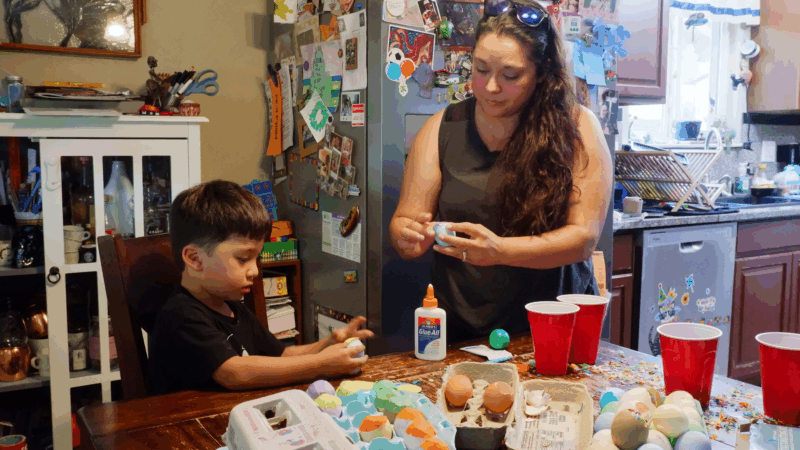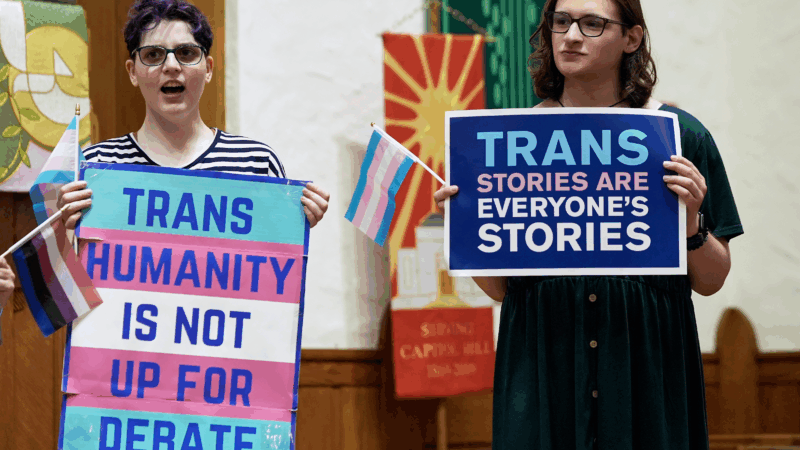A Texas Easter tradition connects the generations
AUSTIN, Texas — When Denise Solis’ mother, Rosemary Valdez, was sent home on hospice with stomach cancer in 2003, it was almost time for Easter. It was a tradition for the two of them to make Easter baskets together for the family’s younger cousins filled with cascarones — confetti-filled eggs.
“She couldn’t do a lot of things at that point,” said Solis. “But she could fill eggs with confetti.”
Cascarones are most common in Texas and Northern Mexico. When kids find cascarones on Easter Sunday, they playfully break them over each other’s heads — filling one another’s hair with colorful confetti.
In those final weeks, Solis spent a lot of time with her mother meticulously emptying eggshells and filling them. Valdez died at age 52 the day before Easter. Solis delivered those Easter baskets to her cousins the next day — filled with one final gift from Valdez.
“I remember us, chasing each other around the backyard and breaking the cascarones over each other’s heads, and just thinking how special that was,” said Solis.
Now, Solis carries on this tradition with her own child. Over the last couple of weeks, every time she cooked an egg, she would carefully poke a hole in the top of the shell, remove the egg, and leave the rest of the shell intact. Then she’d rinse the shell, and sometimes dye it with bright colors. Once they dried, she’d fill them with confetti and seal the tops with tissue paper and glue.
“The egg is a symbol for that opening up, for that entrance to a new life,” said Norma Cantu, a Humanities Professor at Trinity University in San Antonio who grew up with cascarones in Laredo, Texas. The egg was a symbol of fertility and rebirth in pre-Christian Europe that was later adapted to the Easter holiday. “And that’s what Easter is — it’s the celebration of the resurrection.”
Scholars say cascarones have been a part of Texan Easter celebrations since the state was part of Mexico.
For Solis, cascarones are a powerful connection to the past, and something she is excited to pass to her 4-year-old son, Noah.
Solis and her husband hide the cascarones in the backyard, and Noah and his friends eagerly search for them. They laugh and shout as they cover each other in confetti.
Watching this scene play out, Solis is reminded of her mother.
“She was always showering us with love and care and wanting us to feel special and have fun,” Solis said. “Seeing the confetti flying in the air, I just felt the love.”
U.S. gave Ukraine and Russia June deadline to reach peace agreement, Zelenskyy says
"The Americans are proposing the parties end the war by the beginning of this summer," Zelenskyy said, speaking to reporters on Friday.
U.K. leader’s chief of staff quits over hiring of Epstein friend as U.S. ambassador
British Prime Minister Keir Starmer's chief of staff resigned Sunday over the furor surrounding the appointment of Peter Mandelson as U.K. ambassador to the U.S. despite his ties to Jeffrey Epstein.
Trump administration lauds plastic surgeons’ statement on trans surgery for minors
A patient who came to regret the top surgery she got as a teen won a $2 million malpractice suit. Then, the American Society of Plastic Surgeons clarified its position that surgery is not recommended for transgender minors.
What you should know about Bad Bunny’s Super Bowl halftime show
Will the Puerto Rican superstar bring out any special guests? Will there be controversy? Here's what you should know about what could be the most significant concert of the year.
Sunday Puzzle: -IUM Pandemonium
NPR's Ayesha Rascoe plays the puzzle with KPBS listener Anthony Baio and Weekend Edition Puzzlemaster Will Shortz.
Thailand counts votes in early election with 3 main parties vying for power
Vote counting was underway in Thailand's early general election on Sunday, seen as a three-way race among competing visions of progressive, populist and old-fashioned patronage politics.








